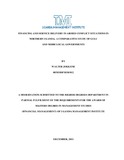| dc.contributor.author | Jokkene, Walter | |
| dc.date.accessioned | 2020-03-02T15:30:54Z | |
| dc.date.available | 2020-03-02T15:30:54Z | |
| dc.date.issued | 2011-12 | |
| dc.identifier.citation | Jokkene, Walter (2011) Financing and Service Delivery in Armed Conflict Situations in Northern Uganda: A Cooperative Study of Gulu and Nebbi Local Governments. | en_US |
| dc.identifier.uri | https://hdl.handle.net/20.500.12305/863 | |
| dc.description.abstract | The study examined how financing affected service delivery in Gulu district in comparison to
Nebbi. Financing policy under decentralization seemed to be ineffective in Gulu due to over
20 years of armed conflicts and as a result service delivery appeared to be deteriorating. Reviewed literature showed that low local tax levels seemed to have severely led to underfunding of local priorities and co-funding obligations. Conditions and rigidity of conditional transfers affected their timely utilization in armed conflicts environment. Financial control was weakened by a shortage of resources and skilled personnel in auditing, and lack of technical and political capacity to shape public service delivery. The study used quantitative and qualitative methods. Data were collected with the use of interviews, questionnaires,
observations and document analysis. The findings were that service delivery was poorer in Gulu district than Nebbi; the level of local tax was too low to fund local priorities and co-fund matching grants. Conditional transfers were not suitable; Gulu failed to use it and even failed to complete projects under matching grants. Financial control was weaker in Gulu compared to Nebbi. In conclusion, financing policy leads to poor service delivery in armed conflict situations; the lower the level of local tax and the higher the failures to utilize conditional transfers timely; and the weaker the financial control, the poorer the service delivery. The study recommends that Local governments in armed conflicts should be allowed flexibility in the use of conditional grants and the use of equalization grants to co-fund matching grants. Central Government should establish policy interventions to motivate and attract public servants to work in war-ravaged areas and fund district councils, commissions and boards of districts in armed conflict situations. | en_US |
| dc.language.iso | en | en_US |
| dc.publisher | Uganda Management Institute | en_US |
| dc.subject | Armed Conflict Situations | en_US |
| dc.subject | Financial Service Delivery | en_US |
| dc.subject | Gulu District Local Government | en_US |
| dc.subject | Nebbi District Local Government | en_US |
| dc.title | Financing and service delivery in armed conflict situations in northern Uganda: A Cooperative Study of Gulu and Nebbi Local Governments. | en_US |
| dc.type | Thesis | en_US |

